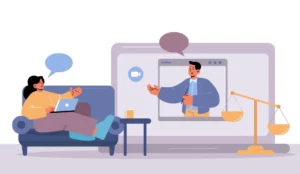Online therapy is emerging as an increasingly popular option, providing accessible, supportive, and diverse therapeutic services to meet the unique needs of the LGBTQ+ community. This blog post will delve into the advantages of online therapy, what to expect, and how it is championing a fresh wave of mental health support for the LGBTQ+ community.
Contents
Is Online Therapy Good For LGBTQ?
 Online therapy can be an effective form of support for the LGBTQ+ community. It provides a safe and accessible platform where individuals can seek professional help from trained therapists who understand and are sensitive to the unique experiences and challenges associated with being LGBTQ+. Such platforms offer a judgment-free zone where individuals can discuss their feelings, struggles, and identity issues.
Online therapy can be an effective form of support for the LGBTQ+ community. It provides a safe and accessible platform where individuals can seek professional help from trained therapists who understand and are sensitive to the unique experiences and challenges associated with being LGBTQ+. Such platforms offer a judgment-free zone where individuals can discuss their feelings, struggles, and identity issues.
And, even seek advice about coming out. The sessions can be conducted in the comfort of one’s own home, reducing the stress of traveling or being in unfamiliar environments.
The online space often gives users access to a wider range of therapists. This variety allows individuals to choose therapists with specific expertise in LGBTQ+ issues. That might not be available in their local areas. Overall, online therapy can be a highly valuable resource for mental health support within the LGBTQ+ community.
How Does Online Therapy For LGBTQ Work?
Online therapy for LGBTQ individuals functions much like traditional therapy but with added features. The process typically starts with finding a suitable online therapy provider. Numerous platforms have emerged that cater to the LGBTQ+ community, offering therapists who specialize in LGBTQ+ issues and concerns.
Once you’ve chosen a platform, you’ll often be asked to fill out a questionnaire. This survey helps match you with a suitable therapist based on your preferences, needs, and the specific issues you wish to address.
Sessions are then conducted virtually, via video calls, voice calls, text messages, or a mix of these. This actually depends on the platform and your comfort level. These sessions provide a safe space to discuss your feelings, experiences, and challenges.
Confidentiality is paramount in online therapy just as it is in traditional therapy. This will ensure that your sessions are a private and safe space for you to express yourself. Ultimately, online therapy for LGBTQ aims to provide supportive, understanding, and specialized care to help individuals.
What Are The Advantages Of Choosing Online Therapy?
 Online therapy, also known as e-therapy or teletherapy, has a wide range of advantages, many of which stem from its digital nature:
Online therapy, also known as e-therapy or teletherapy, has a wide range of advantages, many of which stem from its digital nature:
- Accessibility
Online therapy is particularly beneficial for those who live in remote areas or who lack access to transportation. As it can be accessed from any location with an internet connection. This is also advantageous for those with physical disabilities or other health conditions that may make it difficult to leave the house.
- Flexibility
Online therapy often offers more flexible hours than traditional in-person therapy. This makes it easier for individuals to fit sessions into their schedules.
- Anonymity
Some individuals may feel more comfortable discussing sensitive topics from the privacy of their own homes. The distance provided by online therapy can sometimes make it easier to open up about personal issues.
- Wide Range of Therapist Options
Online therapy gives individuals access to a broad range of therapists who they might not be able to see in person due to geographical constraints. This can be particularly beneficial for people seeking therapists with specific expertise, such as those well-versed in LGBTQ+ issues.
- Continuity of Care
Online therapy can ensure continuity of care for individuals who travel frequently. Regardless of their location, individuals can continue to attend their therapy sessions.
- Reduced Stigma
For some individuals, there may be a stigma associated with receiving therapy. Online therapy allows people to seek help discreetly, which may make them more likely to do so.
- Lower Cost
Online therapy can often be less expensive than traditional in-person therapy, as therapists don’t have to account for costs such as renting office space.
- Comfort
Many individuals find it easier to discuss personal issues in the familiar and safe environment of their own homes.
Each of these advantages contributes to making online therapy an attractive option for many individuals seeking mental health support.
What To Expect With An Online Session?
Online therapy can take many forms, depending on the platform and the preferences of the therapist and client. But the essential elements of a therapy session remain consistent. Here’s what you can typically expect:
- Scheduling
Once matched with a therapist, you will arrange a time for your session that works for both of you. Some platforms may allow for more flexible or immediate sessions, depending on the service.
- Setting
Prior to the session, ensure you have a quiet, private space where you can speak openly without fear of being overheard or interrupted. It’s also important to have a stable internet connection for the duration of the session.
- Communication Method
Sessions can be conducted via secure video calls, phone calls, live chat, or even email, depending on the platform and your preference. Video sessions are common, as they allow for non-verbal communication.
- Structure
Just like a face-to-face session, online therapy will usually begin with a conversation about your current feelings and experiences. You will then discuss these more deeply with your therapist, working towards strategies and solutions. Depending on your therapeutic approach, this could involve talking through experiences, practicing skills, or setting goals.
- Duration
Sessions typically last between 45 to 60 minutes, much like traditional in-person therapy.
- Confidentiality
All communication during your session should be confidential and secure. Therapists should adhere to the same ethical and confidentiality guidelines as they would in an in-person session.
- Homework
At the end of the session, your therapist may give you tasks or exercises to do in your own time. This could be things like journaling, mindfulness exercises, or practicing new skills.
- Follow-up
After the session, you’ll usually schedule the next appointment. Some platforms may allow you to message your therapist in between sessions if you have questions or concerns.
Remember, it’s normal to feel a bit nervous before a therapy session, especially if it’s your first time. Take some time to get comfortable with the technology and platform. And make sure to communicate any concerns or questions to your therapist. They are there to support you.
How To Find The Right Online Therapist For LGBTQ?
 Finding the right therapist is a critical part of the therapeutic journey. Especially for individuals within the LGBTQ+ community who may be dealing with specific challenges or concerns related to their identity. Here are several steps you can take to find the right online therapist:
Finding the right therapist is a critical part of the therapeutic journey. Especially for individuals within the LGBTQ+ community who may be dealing with specific challenges or concerns related to their identity. Here are several steps you can take to find the right online therapist:
1. LGBTQ+ Specialization
Look for therapists who specialize in LGBTQ+ issues or have a history of working with the community. They’ll have a deeper understanding of the unique challenges and experiences associated with being LGBTQ+.
2. Check Their Credentials and Experience
Make sure the therapist is licensed in their field of expertise and has relevant experience. You can usually find this information on the therapist’s profile on the therapy platform or their personal or professional website.
3. Therapeutic Approach
Therapists use various therapeutic methods, such as cognitive-behavioral therapy (CBT), psychodynamic therapy, person-centered therapy, etc. Research these approaches to see which might be a good fit for you.
4. Comfort Level
It’s important to feel comfortable with your therapist. Most platforms will allow you to have a brief initial consultation or exchange messages with the therapist before starting regular sessions.
5. Reviews and Testimonials
Check reviews or testimonials from other clients, if available. This can give you an idea of what to expect from the therapist.
6. Privacy and Confidentiality Policies
Ensure the platform you choose follows strict privacy and confidentiality policies to keep your personal information and discussions secure.
Remember, it might take time and potentially even a few tries to find the right therapist, and that’s okay. The therapeutic relationship is very personal, and it’s important to find someone who’s a good fit for your unique needs and experiences.
Conclusion
Online therapy has rapidly transformed mental health services globally, offering unparalleled accessibility, comfort, and flexibility. For the LGBTQ+ community, these changes have been especially meaningful. The shift to the digital space has allowed for the development of therapy services that are specially tailored to the unique experiences and challenges of LGBTQ+ individuals.
As we continue to advance in the digital age, online therapy promises to be a continually evolving resource. Life may sometimes be challenging for people from the LGBTQ community, but Online LGBTQ Counseling can help. Get experienced LGBTQ therapists at PrideMantra: Book a trial LGBTQ therapy session


